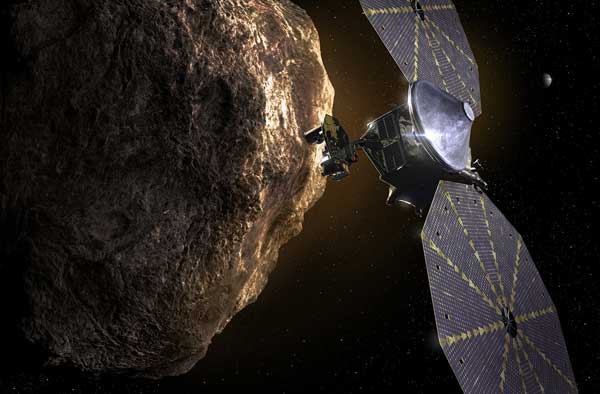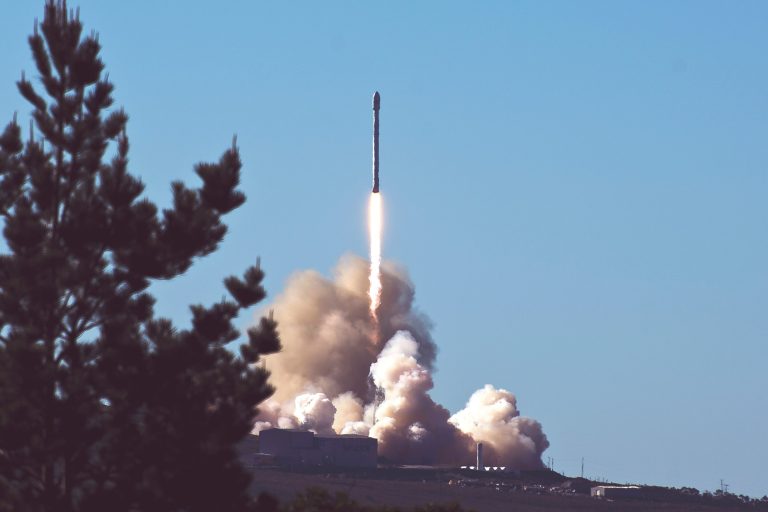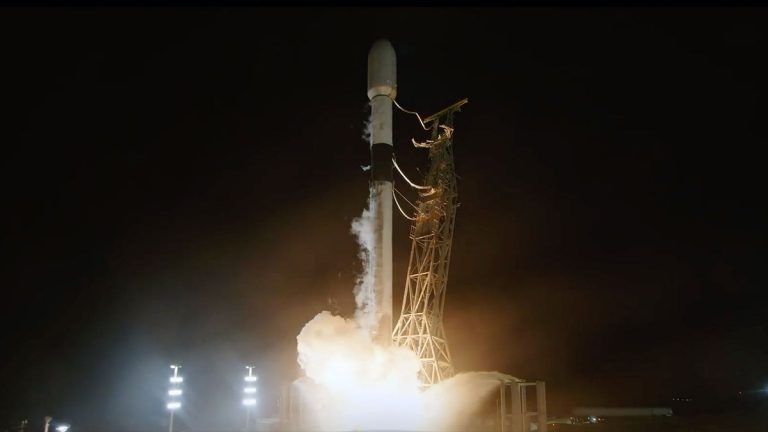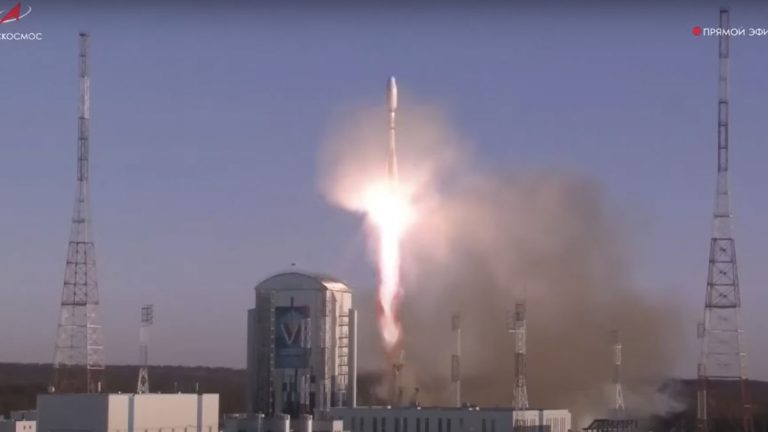
NASA Sets Coverage, Invites Public to Virtually Join Lucy Launch (Image Credit: SNN)
KENNEDY SPACE CENTER, Fla. (NASA PR) — NASA will provide coverage of upcoming prelaunch and launch activities for Lucy, the agency’s first mission to explore the Jupiter Trojan asteroids.
Lucy is scheduled to launch no earlier than 5:34 a.m. EDT Saturday, Oct. 16, on a United Launch Alliance (ULA) Atlas V 401 rocket from Space Launch Complex 41 at Cape Canaveral Space Force Station in Florida.
Live launch coverage will begin at 5 a.m. EDT on NASA Television, the NASA app, and the agency’s website. NASA will hold a prelaunch briefing Wednesday, Oct. 13, and science and engineering briefings Oct. 14.
Over its 12-year primary mission, Lucy will explore a record-breaking number of asteroids. The spacecraft will fly by one asteroid in the solar system’s main belt and seven Trojan asteroids. Lucy’s path will circle back to Earth three times for gravity assists, which will make it the first spacecraft ever to return to our planet’s vicinity from the outer solar system.
Due to the coronavirus (COVID-19) pandemic, all media participation in news conferences will be remote dial-in only. A phone bridge will be provided for each briefing.
Full mission coverage is as follows. Information is subject to change:
Wednesday, Oct. 13
1 p.m.: Lucy prelaunch news conference with the following participants:
- Thomas Zurbuchen, associate administrator, NASA’s Science Mission Directorate at the agency’s Headquarters in Washington.
- Hal Levison, Lucy principal investigator, Southwest Research Institute.
- Donya Douglas-Bradshaw, Lucy Project Manager at NASA’s Goddard Space Flight Center in Greenbelt, Maryland.
- John Elbon, Chief Operating Officer, United Launch Alliance.
- Launch weather officer, 45th Weather Squadron, Space Launch Delta 45, Cape Canaveral Space Force Station.
- Omar Baez, Lucy Launch Director, NASA’s Launch Services Program at Kennedy Space Center in Florida.
Members of the public may also ask questions online by using #LucyMission on social media.
Thursday, Oct. 14
10 a.m.: NASA EDGE: Live Lucy Rollout Show.
1 p.m.: Lucy science briefing with the following participants:
- Adriana Ocampo, Lucy program executive, NASA Headquarters.
- Cathy Olkin, Lucy deputy principal investigator, Southwest Research Institute.
- Keith Noll, Lucy project scientist, Goddard.
- Hal Weaver, principal investigator for Lucy’s L’LORRI instrument, Johns Hopkins Applied Physics Laboratory.
- Phil Christensen, principal investigator for Lucy’s L’TES instrument, Arizona State University.
- Dennis Reuter, principal investigator for Lucy’s L’Ralph instrument, Goddard.
3 p.m.: Lucy engineering briefing with the following participants:
- Joan Salute, associate director for flight programs, Planetary Science Division, NASA Headquarters.
- Jessica Lounsbury, Lucy project systems engineer, Goddard.
- Katie Oakman, Lucy structures and mechanisms lead, Lockheed Martin Space.
- Coralie Adam, deputy navigation team chief, KinetX Aerospace.
Members of the public may also ask questions, which may be answered in real-time during the segment, by using #LucyMission on social media.
Friday, Oct. 15
3:30 p.m.: NASA Science Live with the following participants:
- Carly Howett, assistant director of the Department of Space Studies, Southwest Research Institute.
- Wil Santiago, deep space exploration engineer, Lockheed Martin Space.
- Donya Douglas-Bradshaw, Lucy project manager, Goddard.
- Brittine Young, mentor for the NASA Lucy L’SPACE academy.
- Wilbert Ruperto, ambassador for the NASA Lucy L’SPACE academy.
This episode will air live on NASA Television and stream live on the agency’s Facebook, Twitter and YouTube channels. Members of the public can participate live by sending questions using #askNASA or posting a comment in the live video chat stream.
NASA TV Launch Coverage
NASA TV live coverage will begin at 5 a.m. Saturday, Oct. 16. For NASA TV downlink information, schedules, and links to streaming video, visit:
Audio only of the news conferences and launch coverage will be carried on the NASA “V” circuits, which may be accessed by dialing 321-867-1220, -1240, -1260 or -7135. On launch day, “mission audio,” countdown activities without NASA TV launch commentary, will be carried on 321-867-7135.
On launch day, a “clean feed” of the launch without NASA TV commentary will be carried on the NASA TV media channel.
NASA Website Launch Coverage
Launch day coverage will be available on the agency’s website. Coverage will include livestreaming and blog updates beginning no earlier than 5 a.m. Oct. 16, as the countdown milestones occur. On-demand streaming video and photos of the launch will be available shortly after liftoff. For questions about countdown coverage, contact the Kennedy newsroom at: 321-867-2468. Follow countdown coverage on our launch blog at:
Public Participation
Members of the public can register to attend the launch virtually. NASA’s virtual guest program for Lucy includes curated launch resources, a behind-the-scenes look at the mission, and the opportunity for a virtual guest launch passport stamp .
Virtual NASA Social
As NASA finalizes launch preparations, the agency invites the public to join its virtual NASA Social for the #LucyMission on Facebook. Stay up to date on the latest mission activities, interact with NASA team members in real-time, and watch the launch.
Watch and Engage on Social Media
Stay connected with the mission on social media, and let people know you’re following it on Twitter, Facebook, and Instagram using the hashtag #LucyMission – and tag the following accounts:
Twitter: @NASA, @NASASolarSystem, @NASASocial, @NASA_LSP, @SLDelta45
Facebook: NASA, NASASolarSystem, NASA LSP, SLDelta45
Instagram: NASA
The launch of this mission is managed by NASA’s Launch Services Program, based at Kennedy, America’s premier multi-user spaceport. Goddard provides overall mission management, systems engineering, and safety and mission assurance. Lucy’s principal investigator is based out of the Boulder, Colorado, branch of Southwest Research Institute. Lucy is the 13th mission in NASA’s Discovery Program. NASA’s Marshall Space Flight Center in Huntsville, Alabama, manages the Discovery Program for the agency’s Science Mission Directorate in Washington.
United Launch Alliance is the rocket provider for Lucy’s launch. Lockheed Martin Space in Littleton, Colorado, built the spacecraft.
– Advertisement –









